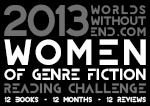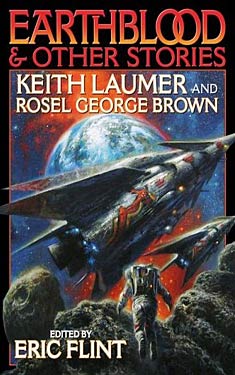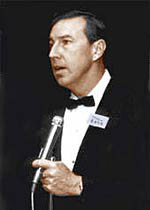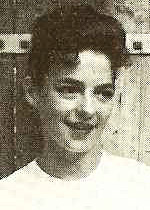WoGF Review: Earthblood & Other Stories by Keith Laumer and Rosel George Brown
 Christine Bellerive (cmbellerive) is an omnivorous reader who devours literary and genre fiction alike. When she’s not reading, she’s editing other people’s books — and writing a fantasy novel of her own. Her other interests include stringed instruments and hunting dogs of the American South. She blogs at Strange Quarks.
Christine Bellerive (cmbellerive) is an omnivorous reader who devours literary and genre fiction alike. When she’s not reading, she’s editing other people’s books — and writing a fantasy novel of her own. Her other interests include stringed instruments and hunting dogs of the American South. She blogs at Strange Quarks.
Editor’s note: This review was submitted on May 30 and counts for May. It just took a few days to get it posted.
 I wanted to pick up some 60s sci-fi as part of the Women of Genre Fiction reading challenge; I chose Earthblood somewhat at random. Rosel George Brown (1926-67) published only a couple dozen short stories and a few novels before her career was tragically cut short by illness. This particular novel was a collaboration with Keith Laumer. Creative collaboration, like sex, is a complicated art form, and no two partners do it quite the same, so to sort out exactly how much of the book is Laumer and how much is Brown would be impossible. I won’t try; I’ll just review the book as one complete whole. However, if you skip to the end, the 2012 Baen reprint also includes some of Brown’s short stories! Win.
I wanted to pick up some 60s sci-fi as part of the Women of Genre Fiction reading challenge; I chose Earthblood somewhat at random. Rosel George Brown (1926-67) published only a couple dozen short stories and a few novels before her career was tragically cut short by illness. This particular novel was a collaboration with Keith Laumer. Creative collaboration, like sex, is a complicated art form, and no two partners do it quite the same, so to sort out exactly how much of the book is Laumer and how much is Brown would be impossible. I won’t try; I’ll just review the book as one complete whole. However, if you skip to the end, the 2012 Baen reprint also includes some of Brown’s short stories! Win.
Roan is the only pure-blooded human being (“Terran”) that anyone on his home planet Tambool has ever met. He arrived on the planet as a frozen embryo, where he was purchased, gestated, and brought up by the alien couple Raff and Bella. He grew up among various alien races, yearning to discover his roots; but centuries ago the Niss laid siege to planet earth and no one has crossed their blockade since. No one’s even sure where earth was, anymore, or if there are any other pure humans left in the universe.
The early chapters make much of young Roan’s human ancestry. His adoptive father venerates it. He tells his son that he’s “a real Terry, genuine Terrestrial strain. Not mutated, like me… and not just humanoid, like your ma. Real Terry — the breed that settled the whole universe — that built the empire, long ago… Look at you: pale skin, like skim-ice, and hair the color of wineberries.”
Much is made of Roan’s white skin; in the first half of the book, the undercurrent of racism is unmistakable. Alien races are inferior, animal-like, and dark; it will take a real human to set the universe to rights again. I felt embarrassed reading it at first, thinking maybe the authors weren’t aware of it, you know, because it was the 1960s. But the thing about this book is, you’re seeing everything from Roan’s perspective, and fear not: his perspective will grow.
I’m not going to give you any spoilers about how that happens: all you need to know going into the story is that the crude, racist model for understanding the world (aliens are dark, stupid, and morally inferior; humans are white, intelligent, and morally superior) is going to be questioned. The book isn’t racist, it’s meant to subvert racism; but you won’t see how unless you stick with Roan for the whole journey. Don’t put it down after that first embarrassing remark!

 Earthblood is definitely a pulpy read. The writing is straightforward action/adventure and Roan’s love interests are two-dimensional damsels in distress borrowed from central casting. Even the social commentary is dated; it’d have to ask much harder questions to be subversive now. Still, the surprise ending is so brilliant, unexpected, and absolutely trippy that it makes the whole thing worthwhile. Based on the first few chapters, I wasn’t sure I wanted to finish this book, but I’m glad I stuck with it.
Earthblood is definitely a pulpy read. The writing is straightforward action/adventure and Roan’s love interests are two-dimensional damsels in distress borrowed from central casting. Even the social commentary is dated; it’d have to ask much harder questions to be subversive now. Still, the surprise ending is so brilliant, unexpected, and absolutely trippy that it makes the whole thing worthwhile. Based on the first few chapters, I wasn’t sure I wanted to finish this book, but I’m glad I stuck with it.
The bonus Rosel George Brown short stories at the end — “Save Your Confederate Money, Boys,” “Flower Arrangement,” “Fruiting Body,” “Visiting Professor,” “Car Pool,” and “And a Tooth” — are delightfully witty. The lighthearted humor was a nice change of pace after Earthblood; Brown is a wry and entertaining writer and it really was a loss to the genre that she passed so young. I would love to know what she might have written for the 70s, 80s, and beyond.



















 Full Details
Full Details


No comments yet.
Sorry, the comment form is closed at this time.